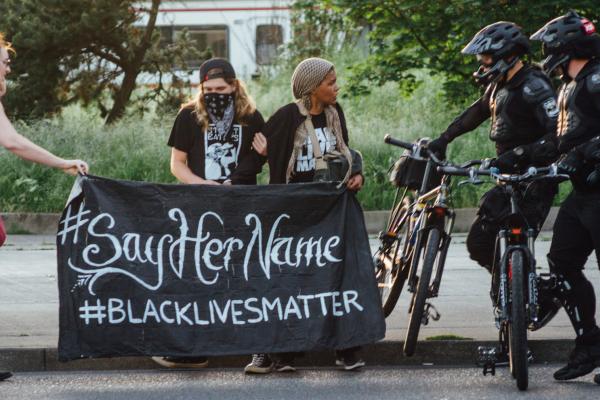The impact of the #SayHerName movement cannot be overstated. It gives voice to black women’s experiences of profiling and policing — setting the names and stories of women, like Sandra Bland and Meagan Hockaday, alongside the names and stories of black men like Trayvon Martin and Michael Brown. The #SayHerName movement is a resource that makes the public aware of the trauma and loss of life experienced by black females in “civilized” society, who often go unnoticed in the media barrage of reports about police brutality of black males or crime incidents from historically black and/or low-income neighborhoods.
With its growing presence across social media and its knowledgeable activists, like Professor Kimberlé Crenshaw, the #SayHerName campaign is reminiscent of John the Baptist’s voice in the wilderness in Matthew 3:1-12. Matthew’s story about John the Baptist’s wilderness experience sits at the intersection between class, political power, cultural identities, social inequities, and religious belief and practice.
Here, John the Baptist, a Jew, “appears” almost out of thin air in the wilderness of Judea as one with no material wealth and luxury to his name. By all appearances, he is a “have not,” with a public and prophetic message for his Jewish kindred representing a spectrum of social and political outlooks. John’s message is simple: Repent, for the kingdom of heaven has come near. Later in Matthew, Jesus will issue the same appeal: “Repent.”
The Gospel reports that John’s message reaches a broad audience, drawing people from Jerusalem, all of Judea, the region along the Jordan, and even “many Pharisees and Sadducees.” Yet John is troubled by the popularity of his message among segments of the population.
He denounces the Pharisees and Sadducees who were willing to affirm his message by “coming for baptism.” The ease at which they accept his message and its moral underpinnings seems to exasperate John. From John’s vantage point (or more accurately stated, the Gospel writer’s vantage point), the Pharisees and Sadducees do not have, to their credit, a record of moral actions reflecting their public confession as symbolized in baptism. In other words, John questions the integrity of their faith confession when he says, “You brood of vipers! Who warned you to flee from the wrath to come? Bear fruit worthy of repentance.”
It’s important to remember that the Pharisees and Sadducees are not analogies for all of Judaism. This is not a moment in which the Gospel of Matthew is pitting Christian and Jewish beliefs and identities against each other. In fact, every character in this story is Jewish! There is no anti-Semitism here.
Historically, the Pharisees and the Sadducees represent two rival Jewish power holders in the Second Temple period. The Pharisees were primarily a lay Jewish group of expert interpreters of the Law of Moses and the “tradition of the fathers.” Their chief sphere of influence was primarily in Jewish synagogues located across Palestine and among Jews dispersed across the Roman world. In contrast, the Sadducees were a priestly aristocracy and political group located primarily in Jerusalem and tied to temple worship and politics.
While these two Jewish groups disagreed about theological issues (i.e. temple relevance, resurrection, existence of angels, etc.), the New Testament characterized them as collaborators in overseeing the political and social well being of the Jewish people in the Roman world. Given that they typically did not agree on theological matters, Matthew’s description of both Pharisees and Sadducees participating in baptism is surprising. John the Baptist is silent, however, about their uncommon agreement concerning ritual matters. Rather, he points out the contradiction between their theological assent and indifferent social and political actions.
Indeed, language and speech run like unifying threads throughout this passage. In the story about John the Baptist’s preaching in the wilderness, the most common verb is the Greek word for “to speak” or “to say” (legō). It appears six times in 12 verses (Matt 3:2, 3, 7, 9). Although the Greek word for “to say” in Matthew 3:2 is not translated in some modern translations, like the NRSV and CEB, the word is present in Greek manuscripts and translated as “saying” in the NIV and NKJV.
The repeated occurrences of “to say” are only one indicator of the importance of radical, transformative speech that challenges leaders to change in practice, not just words. The story about the content of John the Baptist’s message contains other indicators such as language about “proclamation,” the voice crying out, and verbal confessions. This story rings loudly as it follows retellings about Jesus’ ancestry, birth, visitations and celebrations, fear and state-sponsored executions, and resettlement and return. The first voice readers hear after the stories of Jesus’ beginnings is John the Baptist’s courageously prophetic address. John’s voice represents a standard of both spiritual and moral consciousness.
John’s proclamation combines spiritual transformation with a call for institutional reform and social change in an empire that resists it all. In Matthew 3:1, the “wilderness” represents a place uncontrolled by the elite power holders. It symbolizes the place to which God delivered the people of Israel following their rescue from Egypt. The wilderness is also the location of both challenge and refreshment, as portrayed at Jesus’ temptation.
Indeed, the prophetic social quality of John’s story is highlighted in his reinterpretation of Isaiah 40:3. The Isaiah passage confirms that John is levying God’s challenge, not his own. Isaiah 40 speaks of God’s actions to save Israel from their Pharaoh overlord in the Exodus and from their Babylonian overlord in the Exile. The Isaiah passage is not just referring to an immaterial and internal spiritual conversion, but is in fact speaking about God’s deliverance of an oppressed people from discriminatory power, oversight, and mistreatment.
What makes John’s speech so unforgettable and forceful? John’s address and actions model something for modern Christian readers of the gospel. The intersection between present and future is a tense and frustrating space to live in. Yet, that space makes a demand on us. Faithful moral identity that is not wedded to moral social action misses the Gospel’s kingdom vision. In Matthew, the politics and policies of God’s kingdom has a particular focus. It is attentive to the life struggles, circumstances, and traumas of “the poor in spirit,” the persecuted righteous, those of childlike innocence, and sufferers of violence.
The #SayHerName campaign is a modern John the Baptist voice in our midst. It casts a vision that names real bodies and real lives and puts out a courageous and prophetic call to action — a call for us to change. Such transformation involves more than mere calibrations in our personal attitudes and feelings. It is change that demands invisible bodies be made visible. It is a call to systemic, institutional overhauls, in which a society of neighbors hold accountable those neighbors who would target, harm, and exploit some among us.
The loss of life and distress inflicted on female bodies, brown bodies, immigrant bodies, children’s bodies, victims of sex trafficking, the wrongly incarcerated, and so forth represent a corrosion of the kingdom. John the Baptist indicts the leaders because they did the right thing ritually, but not socially. The modern day voices of John the Baptist contend with acts of erasure, maltreatment, and silence by “crying out” from the wasteland until people pay attention, go out, and do something to change their world. At the end of this gospel story, one point is clear — there is no room for silence in the vision of God’s kingdom on earth when bodies lie cold on the pavement.
Got something to say about what you're reading? We value your feedback!

